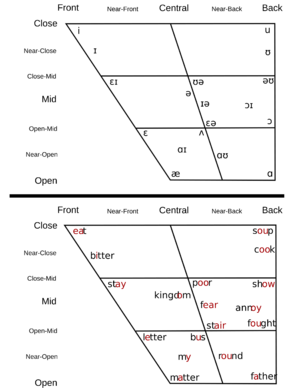Vowel facts for kids
A vowel is a special sound you make by changing the shape of the space in your mouth above your tongue. When you say a vowel sound, air flows freely out of your mouth without being blocked.
In English, it's important to know that a vowel sound is different from a vowel letter in the alphabet. English has five main vowel letters.
All English words are written with vowel letters in them. The letters that are usually vowels in English are:
Contents
Vowel Letters and Sounds
The letters of the English alphabet are used to write either vowel sounds or consonant sounds.
The Letter Y: Sometimes a Vowel, Sometimes a Consonant
The letter Y is special because it can act as both a vowel and a consonant.
It's a vowel in words like cry, sky, fly, my, and why. In these words, Y makes the /aɪ/ sound, like the "eye" sound. In words such as myth and synchronize, Y makes the /ɪ/ sound, like the "i" in "sit". It can also make the /i/ sound, like in only, quickly, and folly.
Y is a consonant when it makes a "yuh" sound at the beginning of words, like yellow, yacht, yam, and yesterday. Most of the time (about 97.5%), Y acts as a vowel.
The Letter W: A Special Case
The letter W can also sometimes be part of a vowel sound. In words like cow, bow, or how, the W helps create the /aʊ/ sound, like the "ow" in "ouch".
W is a consonant when it makes a "wuh" sound at the beginning of words, such as when, where, and wet. In some other languages, like Welsh, W can be a vowel sound, like in the word cwm (which means a kind of valley).
More Sounds Than Letters!
In written English, the six vowel letters (A, E, I, O, U, Y) are used to show about 13 to 15 different vowel sounds. This means there are many more vowel sounds than there are vowel letters. This can make English spelling tricky because the letters don't always tell us exactly what sound to make.
The rest of the letters in the alphabet are consonants:
Understanding Vowel Sounds
The study of speech sounds is called phonetics. To help people understand and write down sounds, linguists use the IPA. In the IPA, each symbol stands for one specific sound. This makes it very helpful for learning how to pronounce words correctly.
Simple Vowels (Monophthongs)
Simple vowels are called monophthongs. When you say a monophthong, your tongue stays in one position. Here are some common monophthong sounds in English (these are for General American English):
- /i/ as in police, feet, eat, and silly
- /ɪ/ as in it, sit, kick, myth, and bitter
- /ɛ/ as in end, bet, less, and letter
- /æ/ as in at, apple, fat, and matter
- /u/ as in cool, tune, soup, and kung fu
- /ʊ/ as in cook, should, pudding, foot, and rook
- /ʌ/ as in bus, blood, come, and up
- /ə/ (called "schwa") as in kingdom, photography, philosophy, ketchup, and hundred
- /ɚ/ as in butter, collar, flavor, firm, and burst
- /ɔ/ as in all, fought, hot, and bot
- /ɑ/ as in father, walk, arm, heart, wasp, lager, envelope, and aardvark
Gliding Vowels (Diphthongs)
Diphthongs are a mix of two different vowel sounds. When you say a diphthong, your tongue moves from one vowel position to another. If you say the words below slowly, you can hear the two sounds blending together.
Common diphthongs in English include:
- /eɪ/ as in ate, reign, vain, flavor, slay, and convey
- /oʊ/ as in toe, row, go, boat, mode, and chateau
- /aɪ/ as in eye, I, pie, cry, cypher, climb, lime, light, kayak, Thai, and height
- /aʊ/ as in loud, house, cow, about, Daoism, and Macau
- /oɪ/ as in boy, moist, and Freud
Vowels in Different English Accents
Just like other languages, English has many different dialects (or accents). Different dialects often use slightly different vowel sounds. The IPA symbols help us understand these differences. For example, some American English speakers say the vowels in cot and caught differently. But in other accents, these words sound exactly the same (they are homophones). People who study English dialects often look at how vowel sounds are pronounced differently.
How English Spelling Works
The reason English spelling and pronunciation don't always match up is because all languages change over time. Spoken English keeps changing, but the way words are spelled (the spelling system) doesn't change as quickly.
Related Pages
Images for kids
See also
 In Spanish: Vocal para niños
In Spanish: Vocal para niños



